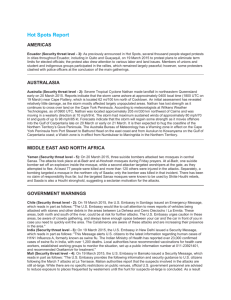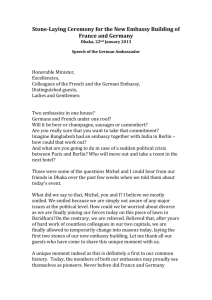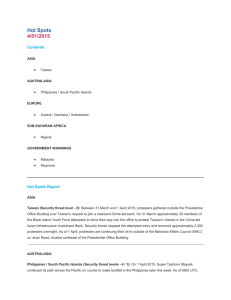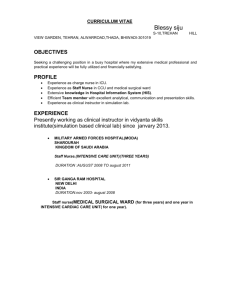03/26/15
advertisement
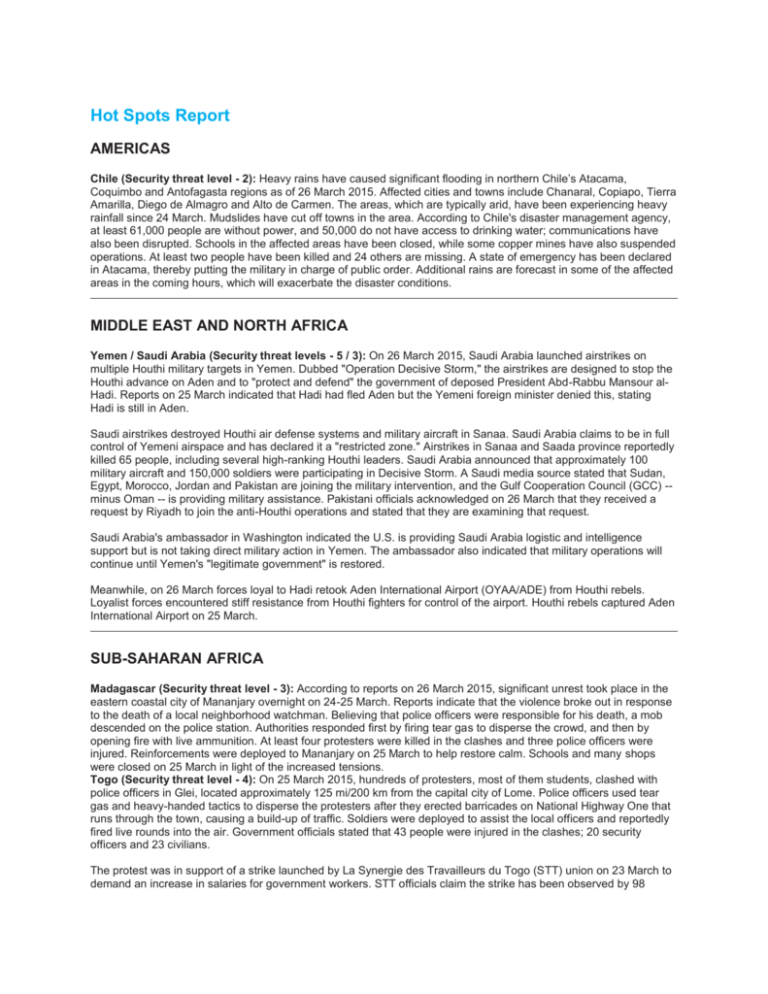
Hot Spots Report AMERICAS Chile (Security threat level - 2): Heavy rains have caused significant flooding in northern Chile’s Atacama, Coquimbo and Antofagasta regions as of 26 March 2015. Affected cities and towns include Chanaral, Copiapo, Tierra Amarilla, Diego de Almagro and Alto de Carmen. The areas, which are typically arid, have been experiencing heavy rainfall since 24 March. Mudslides have cut off towns in the area. According to Chile's disaster management agency, at least 61,000 people are without power, and 50,000 do not have access to drinking water; communications have also been disrupted. Schools in the affected areas have been closed, while some copper mines have also suspended operations. At least two people have been killed and 24 others are missing. A state of emergency has been declared in Atacama, thereby putting the military in charge of public order. Additional rains are forecast in some of the affected areas in the coming hours, which will exacerbate the disaster conditions. MIDDLE EAST AND NORTH AFRICA Yemen / Saudi Arabia (Security threat levels - 5 / 3): On 26 March 2015, Saudi Arabia launched airstrikes on multiple Houthi military targets in Yemen. Dubbed "Operation Decisive Storm," the airstrikes are designed to stop the Houthi advance on Aden and to "protect and defend" the government of deposed President Abd-Rabbu Mansour alHadi. Reports on 25 March indicated that Hadi had fled Aden but the Yemeni foreign minister denied this, stating Hadi is still in Aden. Saudi airstrikes destroyed Houthi air defense systems and military aircraft in Sanaa. Saudi Arabia claims to be in full control of Yemeni airspace and has declared it a "restricted zone." Airstrikes in Sanaa and Saada province reportedly killed 65 people, including several high-ranking Houthi leaders. Saudi Arabia announced that approximately 100 military aircraft and 150,000 soldiers were participating in Decisive Storm. A Saudi media source stated that Sudan, Egypt, Morocco, Jordan and Pakistan are joining the military intervention, and the Gulf Cooperation Council (GCC) -minus Oman -- is providing military assistance. Pakistani officials acknowledged on 26 March that they received a request by Riyadh to join the anti-Houthi operations and stated that they are examining that request. Saudi Arabia's ambassador in Washington indicated the U.S. is providing Saudi Arabia logistic and intelligence support but is not taking direct military action in Yemen. The ambassador also indicated that military operations will continue until Yemen's "legitimate government" is restored. Meanwhile, on 26 March forces loyal to Hadi retook Aden International Airport (OYAA/ADE) from Houthi rebels. Loyalist forces encountered stiff resistance from Houthi fighters for control of the airport. Houthi rebels captured Aden International Airport on 25 March. SUB-SAHARAN AFRICA Madagascar (Security threat level - 3): According to reports on 26 March 2015, significant unrest took place in the eastern coastal city of Mananjary overnight on 24-25 March. Reports indicate that the violence broke out in response to the death of a local neighborhood watchman. Believing that police officers were responsible for his death, a mob descended on the police station. Authorities responded first by firing tear gas to disperse the crowd, and then by opening fire with live ammunition. At least four protesters were killed in the clashes and three police officers were injured. Reinforcements were deployed to Mananjary on 25 March to help restore calm. Schools and many shops were closed on 25 March in light of the increased tensions. Togo (Security threat level - 4): On 25 March 2015, hundreds of protesters, most of them students, clashed with police officers in Glei, located approximately 125 mi/200 km from the capital city of Lome. Police officers used tear gas and heavy-handed tactics to disperse the protesters after they erected barricades on National Highway One that runs through the town, causing a build-up of traffic. Soldiers were deployed to assist the local officers and reportedly fired live rounds into the air. Government officials stated that 43 people were injured in the clashes; 20 security officers and 23 civilians. The protest was in support of a strike launched by La Synergie des Travailleurs du Togo (STT) union on 23 March to demand an increase in salaries for government workers. STT officials claim the strike has been observed by 98 percent of workers in the education and health sectors. Authorities at the University Hospital Sylvanus Olympio Lome, the largest hospital in the country, stated that workers were providing only the minimum amount of emergency services. The strike comes ahead of presidential elections on 15 April. GOVERNMENT WARNINGS Bolivia (Security threat level - 3): On 25 March 2015, the U.K. Foreign and Commonwealth Office (FCO) issued updated travel advice for Bolivia, which reads in part as follows: "Regional and municipal elections will take place on Sunday 29 March. Travel throughout the country by any form of motor vehicle is prohibited on election-day, with effect from midnight on Saturday 28 March. International flights will operate normally, but transport to and from airports will be limited to authorised vehicles only. The sale and consumption of alcohol is prohibited from midnight on Friday 27 March until midnight on Sunday 29 March." Chile (Security threat level - 2): On 25 March 2015, the U.S. Embassy in Santiago issued a Security Message, which reads in part as follows: "The U.S. Embassy informs U.S. citizens traveling and living in the city of Copiapo that the Chilean government has declared a red alert and state of emergency due to the heavy rain and flooding affecting the city. Local weather forecasts indicate that the heavy rains will continue for at least the next 12 hours. The Chilean Government has also declared a sanitary alert as the local water supply may be affected. Flights to and from the city of Copiapo are facing delays. Shelters have been set up in some areas of the city. For additional information, please check ONEMI’s website." Mali (Security threat level - 4): On 25 May 2015, the U.S. Embassy in Bamako issued a Security Message, which reads in part as follows: “The U.S. Embassy informs U.S. citizens that there are two upcoming holidays in Bamako that may be attractive opportunities for extremist activity. In order to ensure the safety of its employees during these holidays, the Embassy has provided the following security instructions to its staff and advises U.S. citizens to also observe this guidance: Thursday, March 26: Avoid restaurants, bars, clubs, churches, theaters, shopping centers, museums, and public organized events. Sunday and Monday, April 5 and 6: Avoid restaurants, bars, clubs, churches, theaters, shopping centers, museums, and public organized events. All Other Days: Reduce exposure to places frequented by westerners until the hunt for suspects-at-large in the La Terrasse case is concluded. “U.S. citizens are reminded to exercise caution, remain vigilant, maintain situational awareness at all times, vary routes, and take appropriate security precautions to ensure their own safety, as should be standard operating procedure at all times. Ensure your personal communications devices are usable in a crisis, and fully employ any safety measures (locks, grills, alarms, etc.) at your residence.” Paraguay (Security threat level - 3): On 25 March 2015, the U.S. Embassy in Asuncion issued a Security Message, which reads in part as follows: "The U.S. Embassy alerts U.S. citizens that the 'Federación Nacional Campesina' has scheduled their yearly march in Asuncion for Thursday March 26, 2015. It has been reported that they plan to start congregating as early as Wednesday, March 25, 2015 in the vicinity of the Parque Seminario in Asuncion located on Kubitschek and 25 de Mayo. The themes for this year’s march include rejection of Public Private Partnership (APP) law, rejection of narcopolitical influence, land reform, and rejection of soybean export development model. "At this time, the exact number of protesters that will arrive in Asuncion is unknown. "The intended route of the protestors is Avenida Kubitschek to Avenida Eusebio Ayala continuing to the city center. The protestors are expected to congregate in the plaza, in front of the congressional building downtown. "Please anticipate major congestion throughout the downtown area. U.S. citizens are strongly urged to avoid all large gatherings or any other event where crowds have congregated to demonstrate or protest. Even demonstrations intended to be peaceful can turn confrontational and escalate into violence. You should avoid areas of demonstrations, and exercise caution if in the vicinity of any large gatherings, protests, or demonstrations. Review your personal security plans; remain aware of your surroundings, including local events; and monitor local news stations for updates. Maintain a high level of vigilance and take appropriate steps to enhance your personal security and follow instructions of local authorities." Uganda (Security threat level - 4): On 25 March 2015, the U.S. Embassy in Kampala issued an Emergency Message, which reads in part as follows: "The U.S Embassy has received information of possible terrorist threats to locations where Westerners, including U.S. citizens, congregate in Kampala, and that an attack may take place soon. Out of an abundance of caution, the U.S. Mission has cancelled some non-essential events scheduled at local hotels in the coming days. U.S. citizens staying or visiting hotels should expect increased security sweeps and delays when entering or exiting hotel areas. "The U.S. Embassy takes this opportunity to remind all U.S. citizens to review your personal security plans; remain aware of your surroundings, including local events; and take appropriate steps to enhance your personal security such as varying your daily routines and avoiding crowded locations." Analyst Comment: At this time there is no additional information available on the possible targets of these potential attacks, although the text of the warning seems to indicate that hotels are under threat; furthermore, no more specificity is available on the timeframe of this warning. Ugandan officials have increased security in response. Those in Kampala at this time should take precautions in light of this warning, including avoiding locations where foreigners tend to gather and other areas that draw large crowds.

